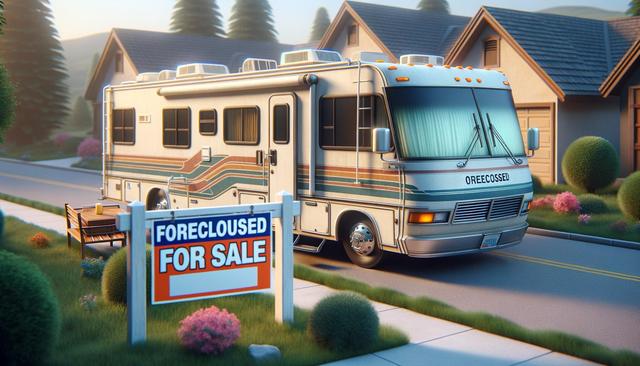
Smart Buying: A Guide to Foreclosed RVs for Sale
Understanding Foreclosed RVs
Foreclosed RVs are vehicles that have been repossessed by banks or lenders after the original owner failed to make loan payments. These RVs are often sold at auction or through specialized dealers, usually at prices lower than market value. The reason they can be more affordable is that lenders are focused on recovering their losses quickly, which creates an opportunity for buyers to find a value-driven purchase. However, purchasing a foreclosed RV requires a good understanding of the process and what to look for to avoid unexpected surprises.
In most cases, foreclosed RVs are sold “as-is,” meaning there are no guarantees about their condition. This makes due diligence crucial. Buyers should be aware that some units might need repairs due to neglect or damage. It’s important to research the RV’s history, inspect it thoroughly, and possibly hire a certified RV technician to assess its mechanical and structural condition before making a purchase. Knowing what to expect and preparing accordingly can help you secure a reliable RV at a lower cost.
Where to Find Foreclosed RVs
There are multiple avenues to find foreclosed RVs, and understanding where to look can make the search more efficient. These vehicles are commonly listed through:
- Online auction sites that specialize in motor vehicles
- Bank and credit union listings
- Government surplus websites
- Local RV dealerships that handle repossessed inventory
- Classified ads and public auction houses
Each of these sources has its own process and requirements for purchasing. Some auctions might require registration and a deposit, while others operate more like traditional sales. It’s essential to verify the legitimacy of the platform and review all terms before participating. Also, check if the RV comes with a title and whether it’s clean, rebuilt, or salvaged, as this can affect registration and future resale value.
Inspecting and Evaluating the RV
Once you find a prospective RV, the next step is a thorough inspection. Even if the listing includes photos and descriptions, an in-person review is critical. Here are several areas that should be examined:
- Exterior condition: Check for rust, water damage, and roof integrity
- Interior features: Inspect flooring, cabinets, appliances, and upholstery
- Mechanical systems: Test the engine, brakes, tires, and generator
- Utilities: Ensure plumbing, electrical, and HVAC systems are functional
A professional RV technician can provide a detailed report and help you understand the cost of any repairs. If possible, ask for maintenance records or signs that regular upkeep was performed. Avoid units that appear abandoned or in severe disrepair unless you’re prepared for a restoration project.
Financing and Budget Considerations
Even though foreclosed RVs are often more affordable, it’s important to budget carefully. Many buyers pay in full, but financing options might be available depending on the seller. Some banks offer RV loans for repossessed units, though terms may vary based on the vehicle’s age and condition. When setting your budget, remember to account for:
- Purchase price
- Inspection and repair costs
- Licensing and registration fees
- Insurance premiums
- Ongoing maintenance and storage
Being financially prepared ensures you don’t overextend yourself and allows room to manage unexpected expenses. It’s also wise to compare prices with similar RVs on the market to confirm the deal is truly beneficial. Keeping a realistic outlook will help you make a sound investment.
Tips for a Successful Purchase
Buying a foreclosed RV can be rewarding if approached with care. Here are some practical tips to guide the process:
- Start with research: Learn about different RV types and brands
- Set your priorities: Know what features you need versus what you want
- Be patient: Don’t rush into the first deal that looks good
- Consult experts: RV inspectors and mechanics can offer valuable insight
- Negotiate when possible: Some sellers may allow room for bargaining
Also, take time to verify the RV’s title status and ensure there are no legal or financial encumbrances. If buying through an auction, understand how bidding works and set a maximum price limit. With preparation and attention to detail, you can find a well-suited RV that meets both your travel goals and financial plan.
Conclusion: Making the Most of Foreclosed RV Opportunities
For those looking to explore the open road without overspending, foreclosed RVs can present a practical and rewarding option. By understanding the buying process, knowing where to look, and inspecting carefully, you can avoid common pitfalls and make a confident purchase. These RVs, with proper care and maintenance, can offer many miles of adventure and freedom. Whether you’re a first-time RV buyer or an experienced traveler seeking an upgrade, the foreclosed market is worth considering as part of your journey planning.


